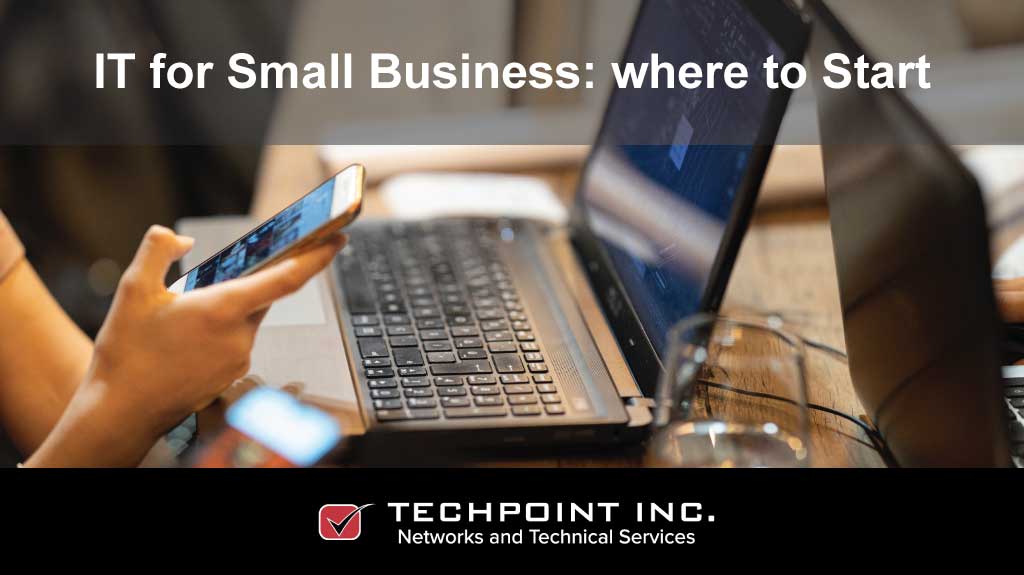Today’s business wouldn’t survive without computers and computer networks, and this is true of small businesses as well as large corporations. If you have a corner store, or a cafe, or a market stand, you’re going to be using information technology (IT) at some point or other, whether it’s when a customer makes a purchase, when you’re doing your accounts, or when you’re printing out price tags or merchandise labels, you’ll be using some kind of computer device and accompanying software.
Where to Focus Your IT Budget
If you’re just setting up a start-up, or maybe wanting to improve your existing business, with the limited dollars available to small businesses, where do you start? Here’s what we think are the most important places to focus your IT budget.
Computer & Network Equipment & Software
Before you do anything, you need to select your hardware and software. There is a plethora of computers, network devices, point of sale and payment equipment, and software out there; our advice is to always purchase the best that you can afford. Aim for computer brands like Dell & Apple, purchase printers from brands such as Epson and HP, and routers from Cisco or NetGear, and as for software, that largely depends on what you do, but Microsoft 365 or a similar office-software suite are essential, as is a good accounts and bookkeeping package such as Sage or QuickBooks, and of course, whatever you need for your actual business software – again purchase the best that you can afford.
Security
After you have your computer & hardware set up, you should make sure you have a robust security system in place. As vital as this is, it can be as simple as installing a good quality security software suite like Norton, Kaspersky, or McAfee on your computer, setting up the firewall on your router, and making sure your software and operating systems are always up-to-date – including desktop computers and mobile devices.
The same goes for your websites; make sure you have some good security measures in place to protect your online presence, especially is you’re selling online. Ensure your website uses SSL security, that you have good hosting, and that you have security module in place on your website – such as WordFence for WordPress sites – to help protect against security threats and malware.
Day-to-Day Organization and Communication
As mentioned at the beginning, some kind of office software suite is vital for communication and organization in your business. Microsoft Office, Google WorkSpace, or Apple iWork, depending on your computer of choice. All offer similar functionality:
- Email, task management, & calendaring
- Word processing
- Spreadsheets
- Presentations
- Graphics
And don’t forget about cloud technology; services like iCloud and Azure deploy apps and storage in the cloud, meaning that you don’t need to worry about backups, specialized software, upgrades, or storage, since all of this is managed for you.
Which one you choose depends on your personal preference and the set up of your business.
Marketing
Marketing for small businesses is crucial to get your brand out there, but it can also be expensive if you’re not careful. Fortunately, in this online age, there’s a lot you can do for yourself without having to commission a marketing agency. Here’s a few ideas:
- Use a Google Business Profile: you can list details about your business, link to your website, and post updates
- Use social media to your advantage: Facebook is the obvious choice, but LinkedIn is great for professional services, but services like Instagram, Pinterest, and Twitter all have something to offer.
- Make sure your SEO is up-to-scratch on your website; the internet doesn’t know that your website is there unless you tell it!
- Create a blog: Easy on WordPress or a similar platform, a blog allows you to share your knowledge and services to the world, while at the same time broadening the scope of your website, and complementing your social media.
- Google Ads and Facebook Ads: both of these are pay-per-click advertising systems that you can customize to your brand and your pocket. They are relatively easy to set up to start with, and they offer ‘as-you-go’ guidance, but when you get deep into them, they can get complex, so ask for help if you need to.
Marketing can become quite involved, so ask for help if you need it.
In Conclusion
It safe to say that technology isn’t going away, and as time goes on, will become even more ensconced into our business and private lives. With that said, it will also become easier to implement and install the solutions that we need to conduct business, but TechPoint will always be here to help should you need support or run into trouble.
